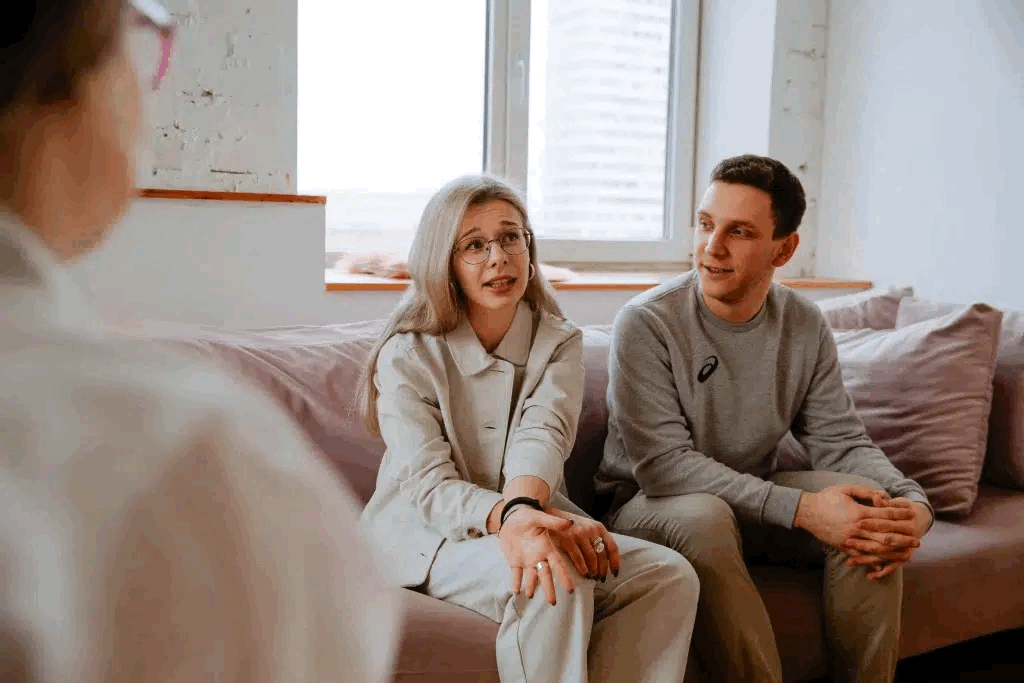REFER SOMEONE ELSE
Refer a loved one to Providence Projects
If you are looking for help with a loved one’s addiction, we’re here to help. Keep reading to discover how to refer a partner, friend or family member.
Have us call you back
Fill out the form below and one of our expert counsellors will call you back within 48 hours
Supporting a loved one through addiction
Addiction is so often much more detrimental to families than to the addict themselves, and we recognise your need for support too, and commend your bravery for taking the first step towards recovery for your loved one.
Below is a simple guide on what to do and what not to do when admitting a loved one to rehab. Our goal is to make this process as straightforward as possible for you and your family. We’re here to answer any questions and alleviate any fears you may have about your loved one entering rehab.
We understand how intimidating this may seem, but please remember that you are making the best possible decision for your loved one – for their future and the well-being of your family.
BY YOUR SIDE
How we keep you involved
It starts with healthy boundaries
Establishing and maintaining healthy boundaries is integral to successful recovery. When you call us, we will guide you in understanding these boundaries. Learning to set and respect limits fosters an environment conducive to healing.
Our experienced team provides valuable insights and tools to navigate these essential aspects of the recovery process for both you and your loved one in our clinic.

Recognising your role in this journey
Family plays a pivotal role in the recovery journey. We recognize the importance of involving and supporting family members as part of the treatment process. Discover resources, insights, and strategies to strengthen familial bonds and contribute positively to your loved one’s recovery.
For more details, visit our Family Therapy page.

How to start talking about rehab with them
When preparing to talk to your loved one about their addiction, start by listing what makes them worthy of getting better.
Focus on their positive traits rather than their mistakes. This will help them open up more easily.
Many individuals with substance use disorders suffer quietly under constant pressure, so take small steps to gently encourage them to accept the need for treatment
Engage them in activities and hobbies to foster connection and create opportunities for them to open up and allow you into their world, making it easier to discuss the process of getting them admitted to Providence Projects.
If your loved one is building a wall between you, consider scheduling a consultation with our therapists to explore the option of setting up an intervention. Our specialists will explain the process and benefits, guiding you through the steps ahead.
The do's & don'ts
✅Do
Maintain your boundaries. Remember that you are also an important person who deserves love and respect.
Encourage professional help. Support all attempts to seek the appropriate professional help for your loved one.
Support fellowship meetings. Encourage attendance at meetings like Alcoholics Anonymous, Cocaine Anonymous, Narcotics Anonymous, or Gambler’s Anonymous. Ask Provy specialists about specific events and concerns you have.
Speak with love and care. Let them know you’re there for them when they’re ready to get help.
Educate yourself. Learn as much as possible about addiction.
Practice self-care. Look after yourself and take time for your well-being.
Support at rehab. Help your loved one feel at home by being there when they need to talk, write to, or invite for therapy.
⛔Don't
Neglect yourself. Do not allow yourself to be mistreated.
Confuse the person with the addiction. Understand that addiction is an illness of the brain, not a character flaw.
Make threats. Fear is never a good way to build trust.
Lecture or dwell on the past. Focus on the future.
Make light-hearted comments. Avoid jokes about the consequences of addiction or substance use.
Impose your thoughts. Allow your loved one to create their own patterns.
Neglect their pain. Acknowledge their experiences and emotions.
Interrupt therapy. Do not intervene during Family Therapy, even if the topics are uncomfortable.
Engage in arguments. Avoid aggressive confrontations; walk away and return when both sides are calm.
Overwhelm them. If your loved one feels overwhelmed, give them a break and revisit the discussion later.
How much does it cost?
At Providence Projects, we prioritise transparency, ensuring you know about all the costs before admitting yourself or your loved one into residential rehab. There are no hidden charges or surprises – our goal is to help you heal and alleviate unnecessary stress, not add to it.
For detailed information about our prices, please visit our costs page here.

REFERRING A LOVED ONE
Kelly & Steven's Story
Kelly Robertson’s unwavering support and determination played a crucial role in Steven’s recovery from addiction. When Steven’s addiction became unbearable, Kelly knew it was time for decisive action.
At Providence Projects, Steven faced his recovery journey with real determination, and Kelly’s ongoing support, combined with the tools and guidance from Providence Projects, enabled Steven to rebuild his life.
He restored relationships, revitalised his business, and created a stable, loving home.
Steven and Kelly’s story shows just how life-changing referring a loved one can be. With determination and the right support, recovery is possible.
If you have a loved one struggling with addiction, reach out today – you’re not alone.
“If it wasn’t for the Providence Projects, we wouldn’t be where we are today…their help was incredible. Their work and the people there helped Steven and gave him the tools to be the person he is today. We will be forever thankful.”

Kelly
Restoring lives and relationships since 1996
Get help for your loved one today
You’ve already done the hard part – recognising you have an addiction. With Providence Projects by your side, you’ll get the support, care and tools you need to take control of your life and enjoy better mental health, free from addiction. Talk to us to find out more about your personalised path to recovery.
Frequently Asked Questions (FAQs) about Rehab
How can I help someone who doesn’t want help?
Unfortunately, this is a common question our team gets asked, and there isn’t a one-size-fits-all answer. Often, an ‘intervention’ can be an effective way to help your loved one accept the help they need. Typically, this involves a carefully planned non-judgemental meeting with close family members, friends, and sometimes professionals. Participants express their concerns and feelings in a compassionate manner, highlighting the impact of the person’s behaviour on themselves and others. The goal is to motivate the individual to agree to seek treatment.
For more information on how interventions work and associated costs, please call us or visit our intervention cost page. We’re here to provide guidance and support every step of the way.
Can family visit?
Absolutely, family visits are welcome! Once you’ve settled in and are actively participating in the programme, you can arrange for family visits, which typically take place on weekends. We encourage these visits as they can provide important support and encouragement during your stay.
What happens after the rehab program ends?
After completing the rehab program, you will work with your therapist to develop a personalised post-treatment plan to help you maintain the progress you’ve made. This plan is tailored to your needs and may include one-on-one counselling, participation in day programs, attendance at self-help groups, as well as activities like meditation, yoga, and family counselling. The goal is to provide ongoing support and resources to help you sustain your recovery and integrate the changes into your daily life. We’re committed to helping you transition smoothly and continue your journey towards long-term wellness.
What factors should I consider when choosing a rehab facility for my loved one?
When choosing a rehab facility for your loved one, consider the following factors to ensure you make an informed decision:
- Track Record: Look for a rehab with a proven track record of at least 20 years. Longevity often indicates stability and effectiveness in treatment.
- CQC Rating: Check the facility’s CQC (Care Quality Commission) rating to ensure it meets high standards of care.
- Reviews: Read reviews and testimonials from past clients to gauge the facility’s reputation and success rates.
Additionally, be cautious of referral agents who recommend clinics for a commission. It’s best to contact rehabs directly to get accurate information and find the best fit for your loved one’s needs.
What role can I play in my loved one’s recovery process?
In your loved one’s recovery process, the key role you can play is practising ‘tough love.’ This means offering support while maintaining clear and healthy boundaries. It’s about balancing compassion with firmness to help them stay committed to their recovery. If you ever feel uncertain about how to proceed, don’t hesitate to call us and speak with one of our therapists for personalised advice on your situation.
How can I find support for myself during this process?
While we will do our best to support you, there are additional resources you might find beneficial. It could be helpful to seek therapy for yourself to process your experiences and emotions. We also recommend joining support groups like Al-Anon or Families Anonymous, which provide a community of others in similar situations and can offer valuable support for both you and your loved one. These resources can help you navigate the challenges and contribute positively to your loved one’s recovery journey.
What kind of follow-up care should I expect to arrange for my loved one?
Follow-up care is tailored to each individual and depends on various factors such as the specific needs of your loved one and their progress during rehab. This may include ongoing counselling, participation in support groups, or engagement in day programs. Our team will work with you and your loved one to create a personalised follow-up plan to support their continued recovery and ensure they have the resources they need for long-term success.